- Pulling off the attack in central Kabul — in one of the most secure neighborhoods in Afghanistan’s most secure city — was designed to send a message that the Taliban is not intimidated by the stepped-up military offensive
- “They’re trying to up the pressure and send a message that you guys aren’t defeating us,”
- “No matter what the coalition does, it can’t win, “It’s a very smart strategy.
Reporting from Kabul, Afghanistan, and New Delhi – A coordinated attack early Friday, which killed at least 16 people and targeted a hotel and guesthouse in central Kabul, underscored the shifting tactics of Taliban insurgents and their keen understanding of geopolitical implications.
Three assailants struck at 6:30 a.m. on the first day of the Afghan weekend, when few people are on the street, in the prosperous Shahr-e-Naw residential area. The Taliban claimed responsibility for the bombings, the first attack in Kabul since January and the capital’s deadliest in months, police and Interior Ministry officials said.
The destruction started with a car bombing that leveled the Arya Guesthouse [...], city Police Chief Abdul Rahman Rahman told reporters.
After the blast, one of the militants set off his explosives vest in front of the ruins while the two others entered the Park Residence guesthouse across the street, which was soon surrounded by police and military. A second assailant then blew himself up, killing three policemen, while the third attacker hunkered down in the basement and was killed about 10:30 a.m. by police gunfire.
Among the dead were six Indians, four Afghan civilians, an Italian diplomat, a French filmmaker and three police officers, officials said. Some bodies were so badly burned it will take time to identify them. At least 36 people were wounded.
[...]
Early morning television broadcast images of a plume of black smoke rising from the area, shattered glass lining the streets and broken windows in shops and homes. Afghan police crouched behind traffic barriers as the remaining gunman remained holed up in the guesthouse basement.
Analysts said the attack appeared to be a well-planned operation aimed at achieving several political objectives.
Pulling off the attack in central Kabul — in one of the most secure neighborhoods in Afghanistan’s most secure city — was designed to send a message that the Taliban is not intimidated by the stepped-up military offensive in the southern city of Marja and can bring the battle to the doorstep of its adversaries.
“They’re trying to up the pressure and send a message that you guys aren’t defeating us,” said John Harrison, a research manager at the International Center for Political Violence and Terrorism Research in Singapore. “And they’re showing they can penetrate the city and stand awhile.”
The early morning timing on a weekend probably made it easier to get the attackers, vehicles, weapons and explosives into position since security forces presumably would be less vigilant; an early start also gives recruits less time for second thoughts. And with streets largely deserted, the attackers are less likely to kill civilians and more likely to find their principal target — foreigners — still sleeping. The insurgent group is wary of a backlash from the Afghan public over civilian deaths.
As suicide bombings have become nearly routine, the combination of a car bombing and suicide blast followed by an armed standoff carries more shock value, providing more of the attention that militants seek. Having armed insurgents stand their ground also sends a message that the fighters are more ideologically committed than some drugged, brainwashed, poorly educated teenager pulling a detonation cord. The combination, with its drawn-out suspense, also gains better TV coverage.
“It prolongs developments, adds to the chaos and brings more publicity,” said Rahul Roy-Chaudhury, senior researcher at the International Institute for Strategic Studies in London. “With a suicide attack, you blow yourself up, that’s it. This has much more impact.”
The choice of the Shahr-e-Naw neighborhood frequented by foreigners and affluent Afghans sent a not-so-subtle message: foreign occupiers and those who follow their profligate ways must be eliminated.
And that the militants targeted a guesthouse serving Indians is probably no accident, analysts said. At one level, the attack is a direct challenge to President Hamid Karzai, who has closely allied himself with India and whom the Taliban opposes for his pro-Western policies and support.
The attack is also a bid to further drive a wedge among Western coalition member countries in the hopes that other nations will follow the Dutch in leaving, as they appear likely to do with the recent fall of their government.
Targeting Indians [...] — coming on the heels of two attacks on the Indian Embassy in Kabul in the last two years — [...] who hope to reduce India’s influence in Afghanistan as the region prepares for the likely power vacuum after the U.S.-led coalition leaves.
[...]
“Pakistan is deeply resentful of India’s footprint in Afghanistan and would like to see it reduced,” said Sadanand Dhume, an Asia Society fellow and author of “My Friend the Fanatic,” a book on radical Islam.
[...]
If tensions rise again between India and Pakistan just as the two have resumed formal talks after a 15-month hiatus following the 2008 Mumbai attack, it could keep more Pakistani troops on the Indian border and away from the Afghan border, where the U.S. would like to see them. The Afghan and Pakistani Taliban could gain more freedom to operate along the porous border.
“If you get India riled up, you divert Pakistan troops,” Harrison said. “The jihadi community is trying to relieve the pressure.”
Finally, there’s the spin that militants put on the attack.
Analysts said that when Afghan police respond to an attack, [...] foreigners are putting Afghans in danger while avoiding it themselves. If coalition troops respond to an attack, [...] that the coalition doesn’t trust locals and views them as lap dogs.
“No matter what the coalition does, it can’t win,” Harrison said. “It’s a very smart strategy.By Mark Magnier and Aimal Yaqubi February 27, 2010. “mark.magnier @latimes.com.Yaqubi is a special correspondent.
RupeeNews








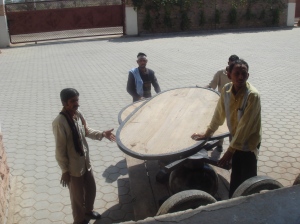


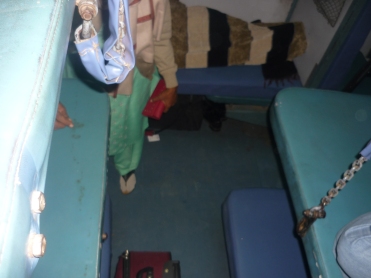

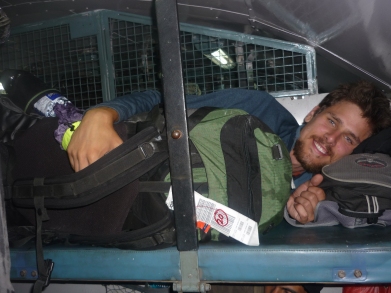
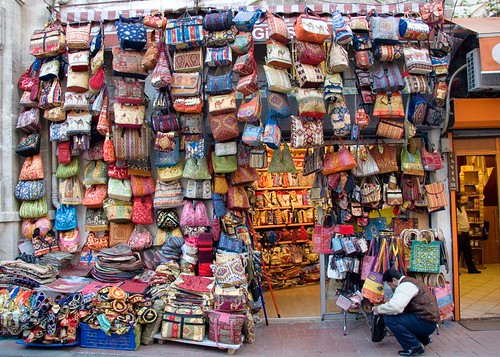
 Reports of a meeting between officials and Babbar Khalsa International (BKI) chief Wadhawa Singh in December have raised concerns among security agencies in the state.
Reports of a meeting between officials and Babbar Khalsa International (BKI) chief Wadhawa Singh in December have raised concerns among security agencies in the state.

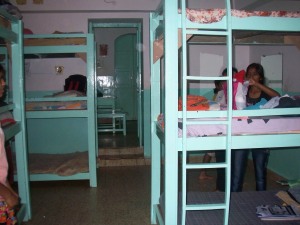
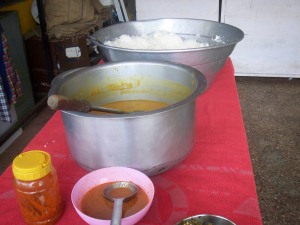



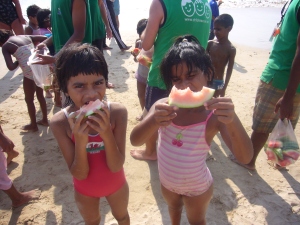
 NEW DELHI (AFP) – The death toll from a blast that ripped through a packed restaurant last weekend in western India, which was claimed by a previously unknown Islamist group has risen to 12, a report said Saturday.
NEW DELHI (AFP) – The death toll from a blast that ripped through a packed restaurant last weekend in western India, which was claimed by a previously unknown Islamist group has risen to 12, a report said Saturday.
 This book’s popularity is spreading like fire. If you are even vaguely in touch with the world of books by Indian authors, there is no way you could have missed this book. The Dork, Sidin Vadukut’s debut novel, is about Robin ‘Einstien’ Varghese’s transition from a B-school graduate to an associate in a business consulting firm. Einstien is a typical naive-and-stupid guy who can be found in every batch of every single college that exists on this earth. He is the kind of guy who sports thick framed glasses, has oil dripping down his hair, has a stupid grin stuck on his face all the time – you know who I am talking about, right? This guy can be found in every movie ever made on college boys and girls. BTW, that description is entirely mine, Vadukut does not give us a glimpse of how Einstien looks like.
This book’s popularity is spreading like fire. If you are even vaguely in touch with the world of books by Indian authors, there is no way you could have missed this book. The Dork, Sidin Vadukut’s debut novel, is about Robin ‘Einstien’ Varghese’s transition from a B-school graduate to an associate in a business consulting firm. Einstien is a typical naive-and-stupid guy who can be found in every batch of every single college that exists on this earth. He is the kind of guy who sports thick framed glasses, has oil dripping down his hair, has a stupid grin stuck on his face all the time – you know who I am talking about, right? This guy can be found in every movie ever made on college boys and girls. BTW, that description is entirely mine, Vadukut does not give us a glimpse of how Einstien looks like. bodies in the open air. His case rested on his religious beliefs as a Hindu, and the inevitable ‘Human Rights”. Needless to say, he has won the right to be cremated in the open air when he dies. All you need to do these days is mention ‘Human Rights’ and your case is won for you.
The case was reviewed by the Master of the Rolls Lord Neuberger and three other judges. In their opinion, Mr. Ghai’s request could be “accommodated within current cremation legislation”.
At the time, I said that this sort of thing should not be allowed, and today I stand by that. It is common practice in India for all Hindu’s who believe it is the only way for the soul to leave the body and enter the ‘afterlife’. Another ‘quirky’ religious tradition among so many invented by people of all faiths.
However, I feel there is a limit on how far a western democratic nation should go to appease immigrants. Especially when it is so one-sided.
bodies in the open air. His case rested on his religious beliefs as a Hindu, and the inevitable ‘Human Rights”. Needless to say, he has won the right to be cremated in the open air when he dies. All you need to do these days is mention ‘Human Rights’ and your case is won for you.
The case was reviewed by the Master of the Rolls Lord Neuberger and three other judges. In their opinion, Mr. Ghai’s request could be “accommodated within current cremation legislation”.
At the time, I said that this sort of thing should not be allowed, and today I stand by that. It is common practice in India for all Hindu’s who believe it is the only way for the soul to leave the body and enter the ‘afterlife’. Another ‘quirky’ religious tradition among so many invented by people of all faiths.
However, I feel there is a limit on how far a western democratic nation should go to appease immigrants. Especially when it is so one-sided.
 So what now! Has this appeal court opened the floodgates for all Hindu’s to be cremated in the open air? Are we now to see Hindu funeral pyres in the fields if we go for a drive? I guess the next thing will be the setting up of ‘official Hindu cremation sites’ in town market squares across the country at the tax payers expense; forget not that Hindu cremations are public affairs in India!
It is the thin end of the wedge my friends. The British Labour Government, with its ‘multi-cultural’ mania is steadily handing over control of the country to the immigrant population at an ever-increasing pace. This is just one more move in that direction. Pretty soon the British People will have no say whatsoever on affairs in their own country. With this case we open the floodgates to all non-conformists and idiots who only have to scream the words ‘Human Rights” at the top of their voices and get whatever they want. Will we be forced to respect the human rights of some obscure religious group who protest it is essential for an animal or human sacrifice to be made so the spirit may leave the body?
I do not blame Mr. Ghai for this, it is not his fault. He is only trying to depart this life in accordance with his religion. No, the ones that are at fault are Gordon Brown and his cohorts, and the British legal system for pandering to immigrants who are slowly taking over control of the country. The rights of decent British families are being pushed to the side to accommodate the more base needs of immigrants who come to our country and expect business as usual and never mind the original inhabitants.
How far down this road is the Labour Party willing to go? I leave you to ponder this question!
Roy
So what now! Has this appeal court opened the floodgates for all Hindu’s to be cremated in the open air? Are we now to see Hindu funeral pyres in the fields if we go for a drive? I guess the next thing will be the setting up of ‘official Hindu cremation sites’ in town market squares across the country at the tax payers expense; forget not that Hindu cremations are public affairs in India!
It is the thin end of the wedge my friends. The British Labour Government, with its ‘multi-cultural’ mania is steadily handing over control of the country to the immigrant population at an ever-increasing pace. This is just one more move in that direction. Pretty soon the British People will have no say whatsoever on affairs in their own country. With this case we open the floodgates to all non-conformists and idiots who only have to scream the words ‘Human Rights” at the top of their voices and get whatever they want. Will we be forced to respect the human rights of some obscure religious group who protest it is essential for an animal or human sacrifice to be made so the spirit may leave the body?
I do not blame Mr. Ghai for this, it is not his fault. He is only trying to depart this life in accordance with his religion. No, the ones that are at fault are Gordon Brown and his cohorts, and the British legal system for pandering to immigrants who are slowly taking over control of the country. The rights of decent British families are being pushed to the side to accommodate the more base needs of immigrants who come to our country and expect business as usual and never mind the original inhabitants.
How far down this road is the Labour Party willing to go? I leave you to ponder this question!
Roy




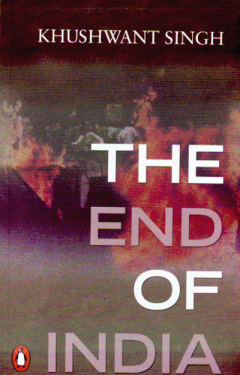 He cautioned not only govt but all stake holders of Indian so called secular society that they should not only forget the partition of India but also accept presence of Pakistan and all Muslims inside and outside of India with open heart. He further suggested that India must accept equal rights of others, do justice with minorities, discourage extremism grouped with militancy and forget to eliminate the low caste Hindus from the society by degrading and disregarding their presence in millions. But unfortunately, since the publication of his book all these evils have unprecedented increase in Indian society.
He cautioned not only govt but all stake holders of Indian so called secular society that they should not only forget the partition of India but also accept presence of Pakistan and all Muslims inside and outside of India with open heart. He further suggested that India must accept equal rights of others, do justice with minorities, discourage extremism grouped with militancy and forget to eliminate the low caste Hindus from the society by degrading and disregarding their presence in millions. But unfortunately, since the publication of his book all these evils have unprecedented increase in Indian society.









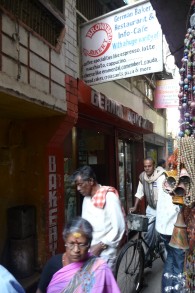 Quite frankly, if you are in search for good German bread and food in India, the subcontinent can be considered quite a disappointment. Although “German bakery” signs are abundant in India’s touristy places, the likelihood of encountering real German bread is very slim (unless you consider croissants, cookies and soft white bread typical German).
Quite frankly, if you are in search for good German bread and food in India, the subcontinent can be considered quite a disappointment. Although “German bakery” signs are abundant in India’s touristy places, the likelihood of encountering real German bread is very slim (unless you consider croissants, cookies and soft white bread typical German). At a breakfast visit in Varanasi’s old town, Leibspeise tested two “belegte Broetchen” (see picture), one with organic cheese and the other with salami (yes, even in India this is possible as the salami is imported from Italy). Both bread rolls were served on organic brown bread and were quite nice. If you enter the bakery and walk up to the first floor (shoes off), there is a very cosy restaurant where you can relax and chose from the restaurant’s enormous menu. In addition to the typical India backpacker menu items (including Italian, Thai, Chinese), you can order such German delights like Schnitzel, Cordon Bleu, Kaesespaetzle, Bratapfel, Laugenbrezel. Leibspeise didn’t want to have a Schnitzel for breakfast, so we can’t tell if it tastes nice, but if you happen to be there, please order it and let us know!
At a breakfast visit in Varanasi’s old town, Leibspeise tested two “belegte Broetchen” (see picture), one with organic cheese and the other with salami (yes, even in India this is possible as the salami is imported from Italy). Both bread rolls were served on organic brown bread and were quite nice. If you enter the bakery and walk up to the first floor (shoes off), there is a very cosy restaurant where you can relax and chose from the restaurant’s enormous menu. In addition to the typical India backpacker menu items (including Italian, Thai, Chinese), you can order such German delights like Schnitzel, Cordon Bleu, Kaesespaetzle, Bratapfel, Laugenbrezel. Leibspeise didn’t want to have a Schnitzel for breakfast, so we can’t tell if it tastes nice, but if you happen to be there, please order it and let us know!
 Many a times I see them airing the videos that are downloaded from youtube.com or like and making it a matter of discussion. What a shame? Is this the level of journalism in India? What’s been shown in Rann is very much likely to happen in reality or who knows if it’s already happening. I have always criticized the way media is behaving and misusing its powers.
Many a times I see them airing the videos that are downloaded from youtube.com or like and making it a matter of discussion. What a shame? Is this the level of journalism in India? What’s been shown in Rann is very much likely to happen in reality or who knows if it’s already happening. I have always criticized the way media is behaving and misusing its powers.